BUS5001 Report: Managing Across Cultures for Aston Martin
VerifiedAdded on 2022/12/16
|16
|5123
|1
Report
AI Summary
This report delves into the complexities of managing across cultures, particularly within the context of Aston Martin's international expansion, specifically focusing on India. It begins with definitions of key terms like HRM, management, motivation, and expatriate, setting the stage for an analysis of the challenges faced by expatriate managers. The report highlights the importance of cultural understanding and communication, contrasting UK and Indian business practices, labor market dynamics, and the role of women in the workplace. It provides actionable suggestions for HR managers, including building strong employee relations and effective communication channels. Furthermore, the report explores necessary adjustments for expatriate managers, covering infrastructural, linguistic, and climatic considerations. It identifies essential HR skills, like employee relations and teamwork, and discusses leadership styles, situational leadership theory, Hofstede's framework, motivation, team building, and communication differences. The report also addresses negotiation styles across cultures and provides examples of successful and unsuccessful international firms. Finally, the report concludes by summarizing key findings and recommendations for successful cross-cultural management.

Managing Across
Cultures
Cultures
Paraphrase This Document
Need a fresh take? Get an instant paraphrase of this document with our AI Paraphraser
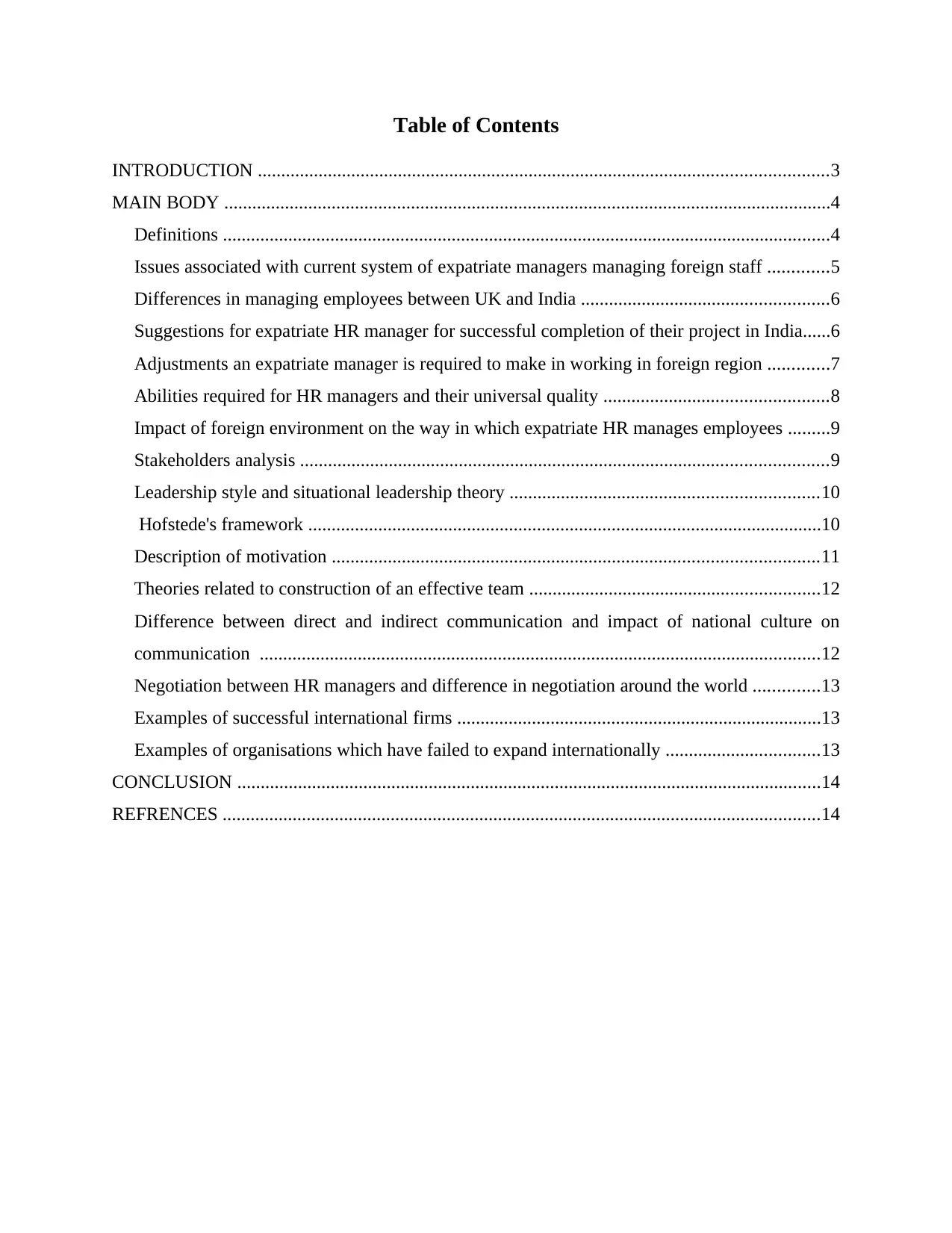
Table of Contents
INTRODUCTION ..........................................................................................................................3
MAIN BODY ..................................................................................................................................4
Definitions ..................................................................................................................................4
Issues associated with current system of expatriate managers managing foreign staff .............5
Differences in managing employees between UK and India .....................................................6
Suggestions for expatriate HR manager for successful completion of their project in India......6
Adjustments an expatriate manager is required to make in working in foreign region .............7
Abilities required for HR managers and their universal quality ................................................8
Impact of foreign environment on the way in which expatriate HR manages employees .........9
Stakeholders analysis .................................................................................................................9
Leadership style and situational leadership theory ..................................................................10
Hofstede's framework ..............................................................................................................10
Description of motivation ........................................................................................................11
Theories related to construction of an effective team ..............................................................12
Difference between direct and indirect communication and impact of national culture on
communication ........................................................................................................................12
Negotiation between HR managers and difference in negotiation around the world ..............13
Examples of successful international firms ..............................................................................13
Examples of organisations which have failed to expand internationally .................................13
CONCLUSION .............................................................................................................................14
REFRENCES ................................................................................................................................14
INTRODUCTION ..........................................................................................................................3
MAIN BODY ..................................................................................................................................4
Definitions ..................................................................................................................................4
Issues associated with current system of expatriate managers managing foreign staff .............5
Differences in managing employees between UK and India .....................................................6
Suggestions for expatriate HR manager for successful completion of their project in India......6
Adjustments an expatriate manager is required to make in working in foreign region .............7
Abilities required for HR managers and their universal quality ................................................8
Impact of foreign environment on the way in which expatriate HR manages employees .........9
Stakeholders analysis .................................................................................................................9
Leadership style and situational leadership theory ..................................................................10
Hofstede's framework ..............................................................................................................10
Description of motivation ........................................................................................................11
Theories related to construction of an effective team ..............................................................12
Difference between direct and indirect communication and impact of national culture on
communication ........................................................................................................................12
Negotiation between HR managers and difference in negotiation around the world ..............13
Examples of successful international firms ..............................................................................13
Examples of organisations which have failed to expand internationally .................................13
CONCLUSION .............................................................................................................................14
REFRENCES ................................................................................................................................14
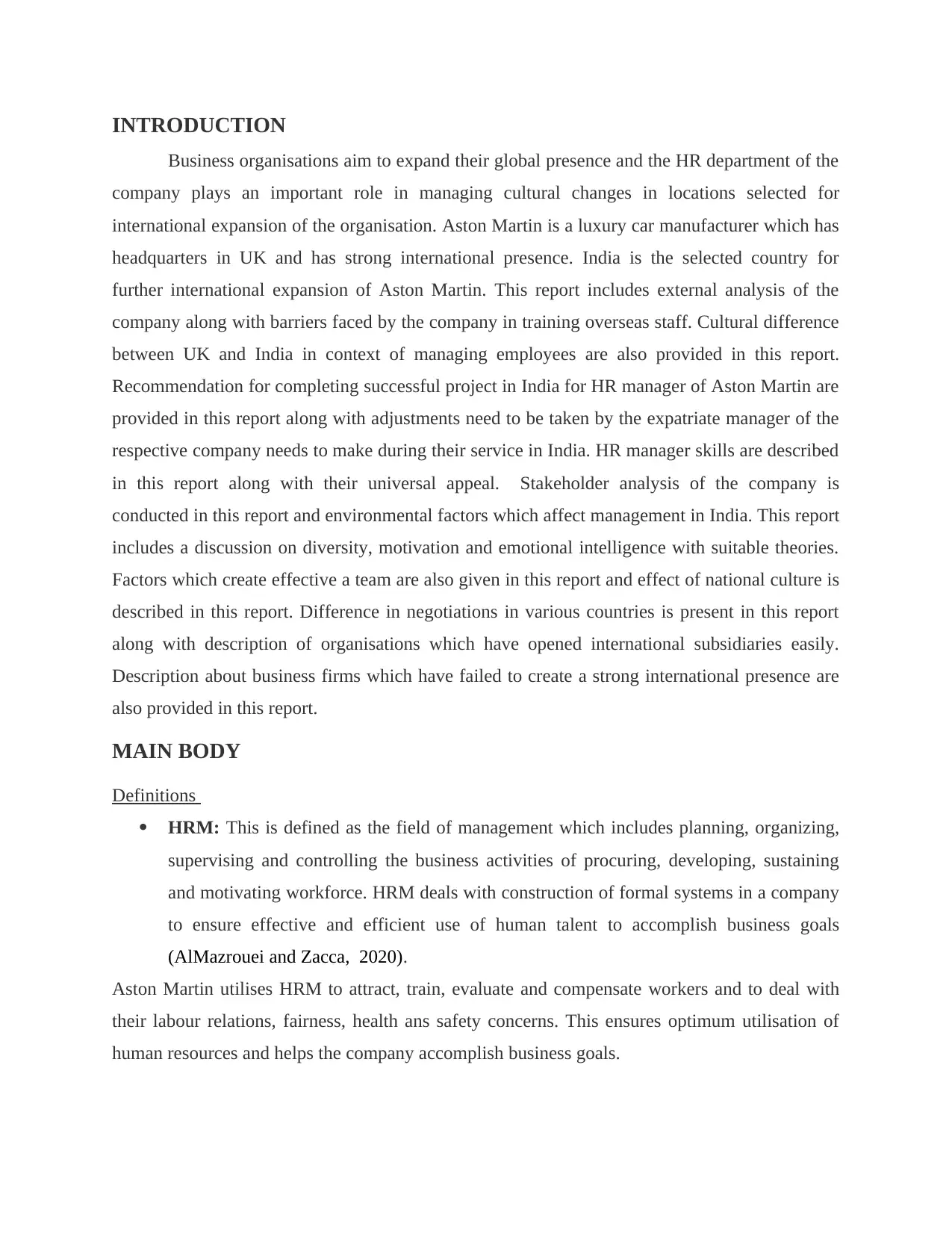
INTRODUCTION
Business organisations aim to expand their global presence and the HR department of the
company plays an important role in managing cultural changes in locations selected for
international expansion of the organisation. Aston Martin is a luxury car manufacturer which has
headquarters in UK and has strong international presence. India is the selected country for
further international expansion of Aston Martin. This report includes external analysis of the
company along with barriers faced by the company in training overseas staff. Cultural difference
between UK and India in context of managing employees are also provided in this report.
Recommendation for completing successful project in India for HR manager of Aston Martin are
provided in this report along with adjustments need to be taken by the expatriate manager of the
respective company needs to make during their service in India. HR manager skills are described
in this report along with their universal appeal. Stakeholder analysis of the company is
conducted in this report and environmental factors which affect management in India. This report
includes a discussion on diversity, motivation and emotional intelligence with suitable theories.
Factors which create effective a team are also given in this report and effect of national culture is
described in this report. Difference in negotiations in various countries is present in this report
along with description of organisations which have opened international subsidiaries easily.
Description about business firms which have failed to create a strong international presence are
also provided in this report.
MAIN BODY
Definitions
HRM: This is defined as the field of management which includes planning, organizing,
supervising and controlling the business activities of procuring, developing, sustaining
and motivating workforce. HRM deals with construction of formal systems in a company
to ensure effective and efficient use of human talent to accomplish business goals
(AlMazrouei and Zacca, 2020).
Aston Martin utilises HRM to attract, train, evaluate and compensate workers and to deal with
their labour relations, fairness, health ans safety concerns. This ensures optimum utilisation of
human resources and helps the company accomplish business goals.
Business organisations aim to expand their global presence and the HR department of the
company plays an important role in managing cultural changes in locations selected for
international expansion of the organisation. Aston Martin is a luxury car manufacturer which has
headquarters in UK and has strong international presence. India is the selected country for
further international expansion of Aston Martin. This report includes external analysis of the
company along with barriers faced by the company in training overseas staff. Cultural difference
between UK and India in context of managing employees are also provided in this report.
Recommendation for completing successful project in India for HR manager of Aston Martin are
provided in this report along with adjustments need to be taken by the expatriate manager of the
respective company needs to make during their service in India. HR manager skills are described
in this report along with their universal appeal. Stakeholder analysis of the company is
conducted in this report and environmental factors which affect management in India. This report
includes a discussion on diversity, motivation and emotional intelligence with suitable theories.
Factors which create effective a team are also given in this report and effect of national culture is
described in this report. Difference in negotiations in various countries is present in this report
along with description of organisations which have opened international subsidiaries easily.
Description about business firms which have failed to create a strong international presence are
also provided in this report.
MAIN BODY
Definitions
HRM: This is defined as the field of management which includes planning, organizing,
supervising and controlling the business activities of procuring, developing, sustaining
and motivating workforce. HRM deals with construction of formal systems in a company
to ensure effective and efficient use of human talent to accomplish business goals
(AlMazrouei and Zacca, 2020).
Aston Martin utilises HRM to attract, train, evaluate and compensate workers and to deal with
their labour relations, fairness, health ans safety concerns. This ensures optimum utilisation of
human resources and helps the company accomplish business goals.
⊘ This is a preview!⊘
Do you want full access?
Subscribe today to unlock all pages.

Trusted by 1+ million students worldwide
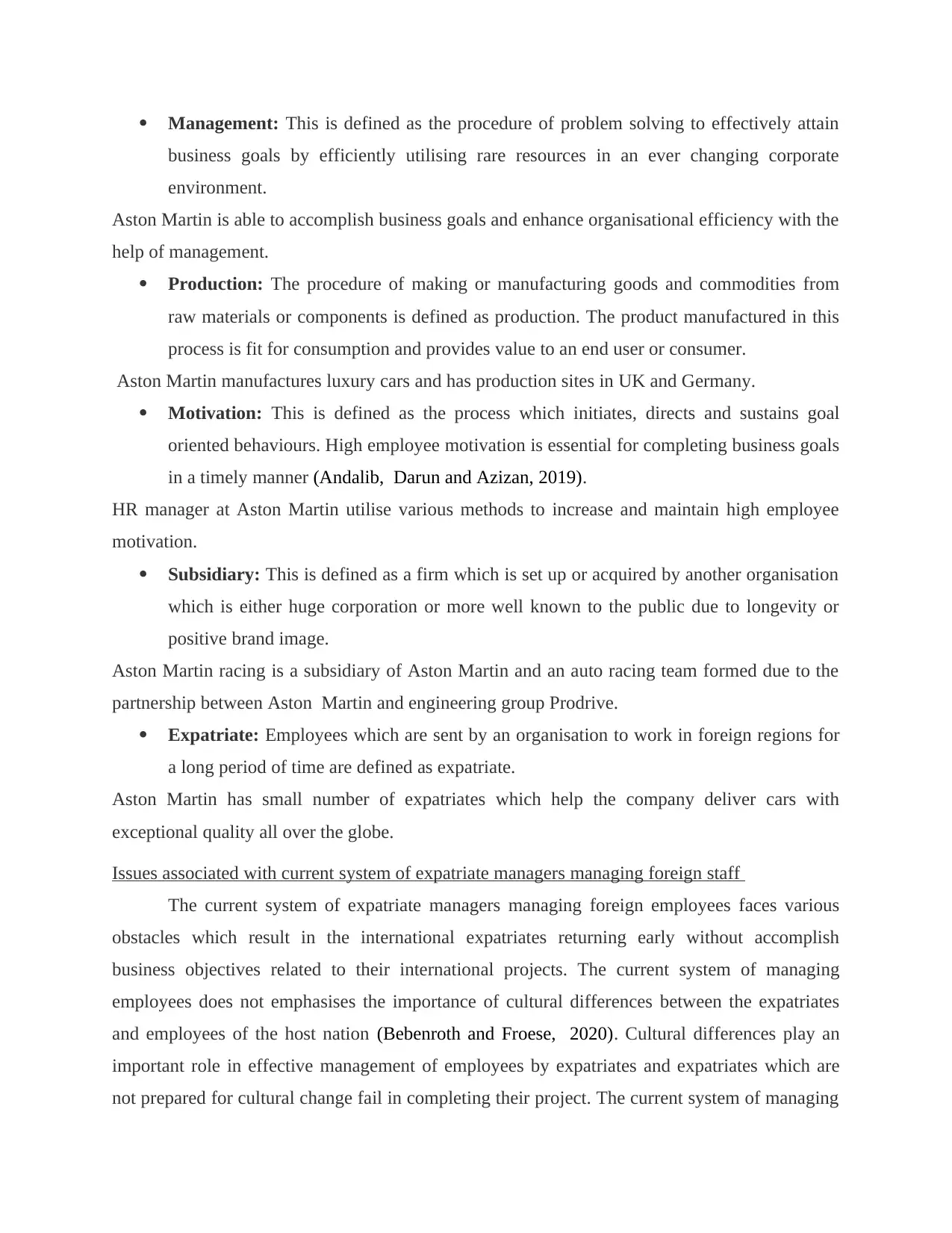
Management: This is defined as the procedure of problem solving to effectively attain
business goals by efficiently utilising rare resources in an ever changing corporate
environment.
Aston Martin is able to accomplish business goals and enhance organisational efficiency with the
help of management.
Production: The procedure of making or manufacturing goods and commodities from
raw materials or components is defined as production. The product manufactured in this
process is fit for consumption and provides value to an end user or consumer.
Aston Martin manufactures luxury cars and has production sites in UK and Germany.
Motivation: This is defined as the process which initiates, directs and sustains goal
oriented behaviours. High employee motivation is essential for completing business goals
in a timely manner (Andalib, Darun and Azizan, 2019).
HR manager at Aston Martin utilise various methods to increase and maintain high employee
motivation.
Subsidiary: This is defined as a firm which is set up or acquired by another organisation
which is either huge corporation or more well known to the public due to longevity or
positive brand image.
Aston Martin racing is a subsidiary of Aston Martin and an auto racing team formed due to the
partnership between Aston Martin and engineering group Prodrive.
Expatriate: Employees which are sent by an organisation to work in foreign regions for
a long period of time are defined as expatriate.
Aston Martin has small number of expatriates which help the company deliver cars with
exceptional quality all over the globe.
Issues associated with current system of expatriate managers managing foreign staff
The current system of expatriate managers managing foreign employees faces various
obstacles which result in the international expatriates returning early without accomplish
business objectives related to their international projects. The current system of managing
employees does not emphasises the importance of cultural differences between the expatriates
and employees of the host nation (Bebenroth and Froese, 2020). Cultural differences play an
important role in effective management of employees by expatriates and expatriates which are
not prepared for cultural change fail in completing their project. The current system of managing
business goals by efficiently utilising rare resources in an ever changing corporate
environment.
Aston Martin is able to accomplish business goals and enhance organisational efficiency with the
help of management.
Production: The procedure of making or manufacturing goods and commodities from
raw materials or components is defined as production. The product manufactured in this
process is fit for consumption and provides value to an end user or consumer.
Aston Martin manufactures luxury cars and has production sites in UK and Germany.
Motivation: This is defined as the process which initiates, directs and sustains goal
oriented behaviours. High employee motivation is essential for completing business goals
in a timely manner (Andalib, Darun and Azizan, 2019).
HR manager at Aston Martin utilise various methods to increase and maintain high employee
motivation.
Subsidiary: This is defined as a firm which is set up or acquired by another organisation
which is either huge corporation or more well known to the public due to longevity or
positive brand image.
Aston Martin racing is a subsidiary of Aston Martin and an auto racing team formed due to the
partnership between Aston Martin and engineering group Prodrive.
Expatriate: Employees which are sent by an organisation to work in foreign regions for
a long period of time are defined as expatriate.
Aston Martin has small number of expatriates which help the company deliver cars with
exceptional quality all over the globe.
Issues associated with current system of expatriate managers managing foreign staff
The current system of expatriate managers managing foreign employees faces various
obstacles which result in the international expatriates returning early without accomplish
business objectives related to their international projects. The current system of managing
employees does not emphasises the importance of cultural differences between the expatriates
and employees of the host nation (Bebenroth and Froese, 2020). Cultural differences play an
important role in effective management of employees by expatriates and expatriates which are
not prepared for cultural change fail in completing their project. The current system of managing
Paraphrase This Document
Need a fresh take? Get an instant paraphrase of this document with our AI Paraphraser
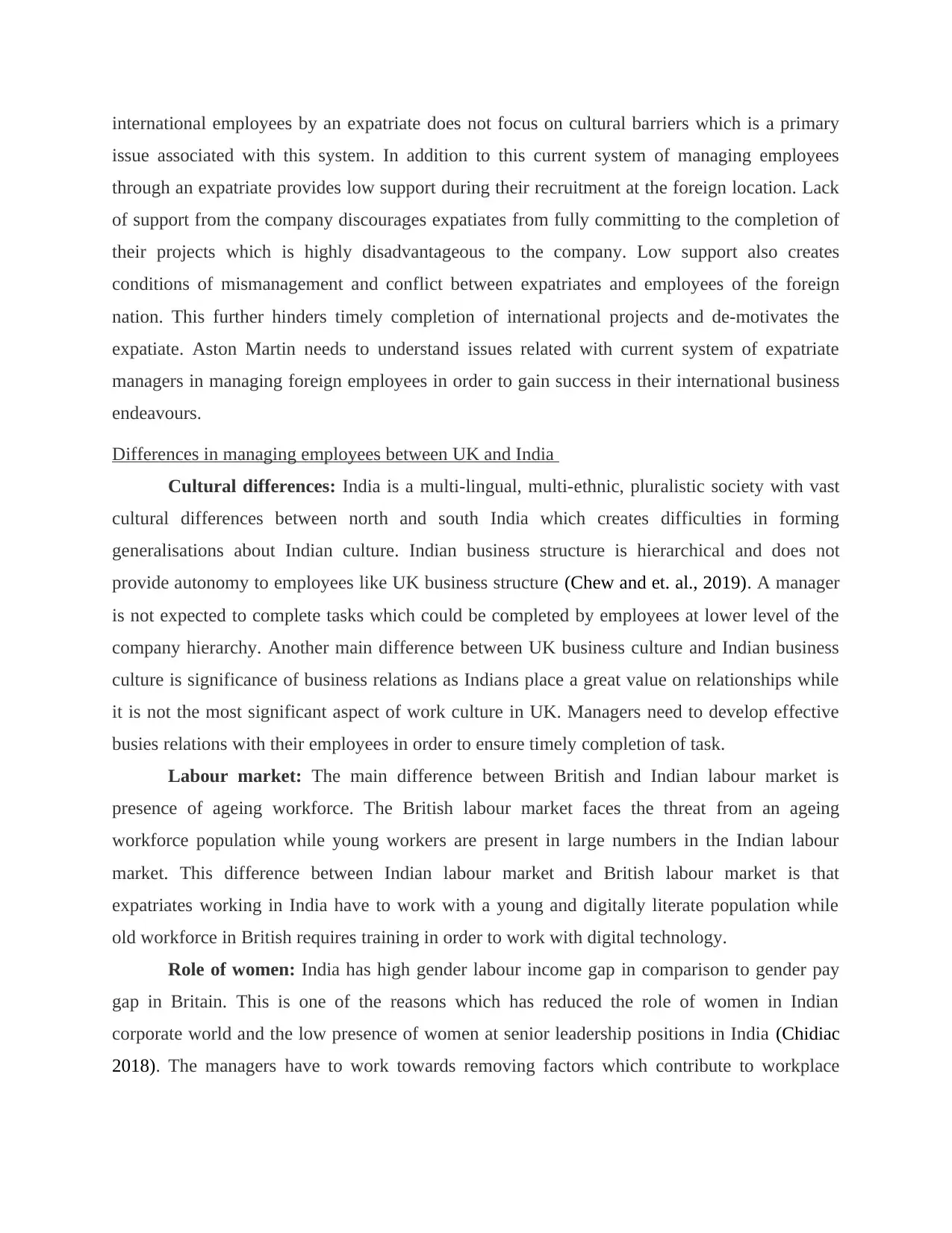
international employees by an expatriate does not focus on cultural barriers which is a primary
issue associated with this system. In addition to this current system of managing employees
through an expatriate provides low support during their recruitment at the foreign location. Lack
of support from the company discourages expatiates from fully committing to the completion of
their projects which is highly disadvantageous to the company. Low support also creates
conditions of mismanagement and conflict between expatriates and employees of the foreign
nation. This further hinders timely completion of international projects and de-motivates the
expatiate. Aston Martin needs to understand issues related with current system of expatriate
managers in managing foreign employees in order to gain success in their international business
endeavours.
Differences in managing employees between UK and India
Cultural differences: India is a multi-lingual, multi-ethnic, pluralistic society with vast
cultural differences between north and south India which creates difficulties in forming
generalisations about Indian culture. Indian business structure is hierarchical and does not
provide autonomy to employees like UK business structure (Chew and et. al., 2019). A manager
is not expected to complete tasks which could be completed by employees at lower level of the
company hierarchy. Another main difference between UK business culture and Indian business
culture is significance of business relations as Indians place a great value on relationships while
it is not the most significant aspect of work culture in UK. Managers need to develop effective
busies relations with their employees in order to ensure timely completion of task.
Labour market: The main difference between British and Indian labour market is
presence of ageing workforce. The British labour market faces the threat from an ageing
workforce population while young workers are present in large numbers in the Indian labour
market. This difference between Indian labour market and British labour market is that
expatriates working in India have to work with a young and digitally literate population while
old workforce in British requires training in order to work with digital technology.
Role of women: India has high gender labour income gap in comparison to gender pay
gap in Britain. This is one of the reasons which has reduced the role of women in Indian
corporate world and the low presence of women at senior leadership positions in India (Chidiac
2018). The managers have to work towards removing factors which contribute to workplace
issue associated with this system. In addition to this current system of managing employees
through an expatriate provides low support during their recruitment at the foreign location. Lack
of support from the company discourages expatiates from fully committing to the completion of
their projects which is highly disadvantageous to the company. Low support also creates
conditions of mismanagement and conflict between expatriates and employees of the foreign
nation. This further hinders timely completion of international projects and de-motivates the
expatiate. Aston Martin needs to understand issues related with current system of expatriate
managers in managing foreign employees in order to gain success in their international business
endeavours.
Differences in managing employees between UK and India
Cultural differences: India is a multi-lingual, multi-ethnic, pluralistic society with vast
cultural differences between north and south India which creates difficulties in forming
generalisations about Indian culture. Indian business structure is hierarchical and does not
provide autonomy to employees like UK business structure (Chew and et. al., 2019). A manager
is not expected to complete tasks which could be completed by employees at lower level of the
company hierarchy. Another main difference between UK business culture and Indian business
culture is significance of business relations as Indians place a great value on relationships while
it is not the most significant aspect of work culture in UK. Managers need to develop effective
busies relations with their employees in order to ensure timely completion of task.
Labour market: The main difference between British and Indian labour market is
presence of ageing workforce. The British labour market faces the threat from an ageing
workforce population while young workers are present in large numbers in the Indian labour
market. This difference between Indian labour market and British labour market is that
expatriates working in India have to work with a young and digitally literate population while
old workforce in British requires training in order to work with digital technology.
Role of women: India has high gender labour income gap in comparison to gender pay
gap in Britain. This is one of the reasons which has reduced the role of women in Indian
corporate world and the low presence of women at senior leadership positions in India (Chidiac
2018). The managers have to work towards removing factors which contribute to workplace
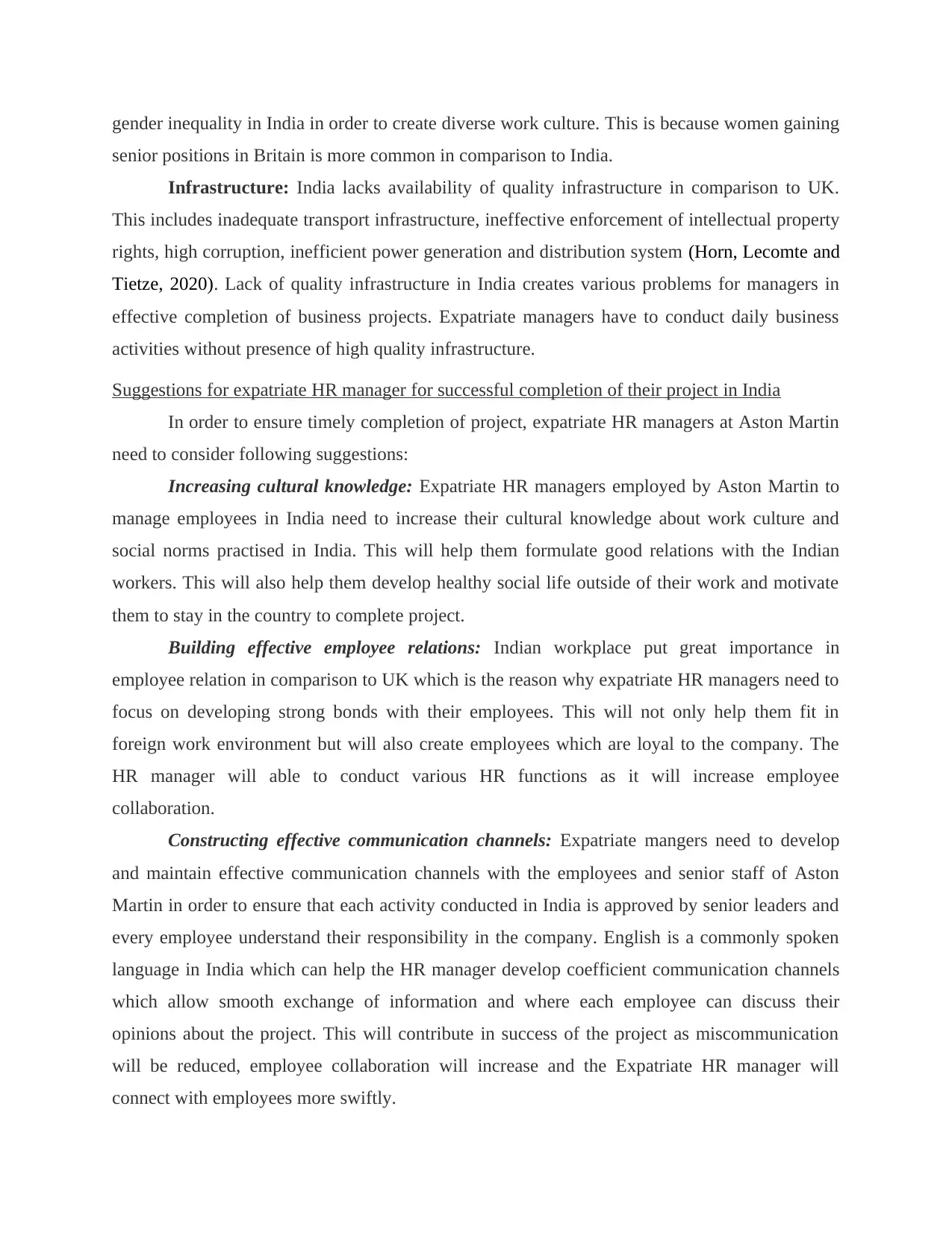
gender inequality in India in order to create diverse work culture. This is because women gaining
senior positions in Britain is more common in comparison to India.
Infrastructure: India lacks availability of quality infrastructure in comparison to UK.
This includes inadequate transport infrastructure, ineffective enforcement of intellectual property
rights, high corruption, inefficient power generation and distribution system (Horn, Lecomte and
Tietze, 2020). Lack of quality infrastructure in India creates various problems for managers in
effective completion of business projects. Expatriate managers have to conduct daily business
activities without presence of high quality infrastructure.
Suggestions for expatriate HR manager for successful completion of their project in India
In order to ensure timely completion of project, expatriate HR managers at Aston Martin
need to consider following suggestions:
Increasing cultural knowledge: Expatriate HR managers employed by Aston Martin to
manage employees in India need to increase their cultural knowledge about work culture and
social norms practised in India. This will help them formulate good relations with the Indian
workers. This will also help them develop healthy social life outside of their work and motivate
them to stay in the country to complete project.
Building effective employee relations: Indian workplace put great importance in
employee relation in comparison to UK which is the reason why expatriate HR managers need to
focus on developing strong bonds with their employees. This will not only help them fit in
foreign work environment but will also create employees which are loyal to the company. The
HR manager will able to conduct various HR functions as it will increase employee
collaboration.
Constructing effective communication channels: Expatriate mangers need to develop
and maintain effective communication channels with the employees and senior staff of Aston
Martin in order to ensure that each activity conducted in India is approved by senior leaders and
every employee understand their responsibility in the company. English is a commonly spoken
language in India which can help the HR manager develop coefficient communication channels
which allow smooth exchange of information and where each employee can discuss their
opinions about the project. This will contribute in success of the project as miscommunication
will be reduced, employee collaboration will increase and the Expatriate HR manager will
connect with employees more swiftly.
senior positions in Britain is more common in comparison to India.
Infrastructure: India lacks availability of quality infrastructure in comparison to UK.
This includes inadequate transport infrastructure, ineffective enforcement of intellectual property
rights, high corruption, inefficient power generation and distribution system (Horn, Lecomte and
Tietze, 2020). Lack of quality infrastructure in India creates various problems for managers in
effective completion of business projects. Expatriate managers have to conduct daily business
activities without presence of high quality infrastructure.
Suggestions for expatriate HR manager for successful completion of their project in India
In order to ensure timely completion of project, expatriate HR managers at Aston Martin
need to consider following suggestions:
Increasing cultural knowledge: Expatriate HR managers employed by Aston Martin to
manage employees in India need to increase their cultural knowledge about work culture and
social norms practised in India. This will help them formulate good relations with the Indian
workers. This will also help them develop healthy social life outside of their work and motivate
them to stay in the country to complete project.
Building effective employee relations: Indian workplace put great importance in
employee relation in comparison to UK which is the reason why expatriate HR managers need to
focus on developing strong bonds with their employees. This will not only help them fit in
foreign work environment but will also create employees which are loyal to the company. The
HR manager will able to conduct various HR functions as it will increase employee
collaboration.
Constructing effective communication channels: Expatriate mangers need to develop
and maintain effective communication channels with the employees and senior staff of Aston
Martin in order to ensure that each activity conducted in India is approved by senior leaders and
every employee understand their responsibility in the company. English is a commonly spoken
language in India which can help the HR manager develop coefficient communication channels
which allow smooth exchange of information and where each employee can discuss their
opinions about the project. This will contribute in success of the project as miscommunication
will be reduced, employee collaboration will increase and the Expatriate HR manager will
connect with employees more swiftly.
⊘ This is a preview!⊘
Do you want full access?
Subscribe today to unlock all pages.

Trusted by 1+ million students worldwide
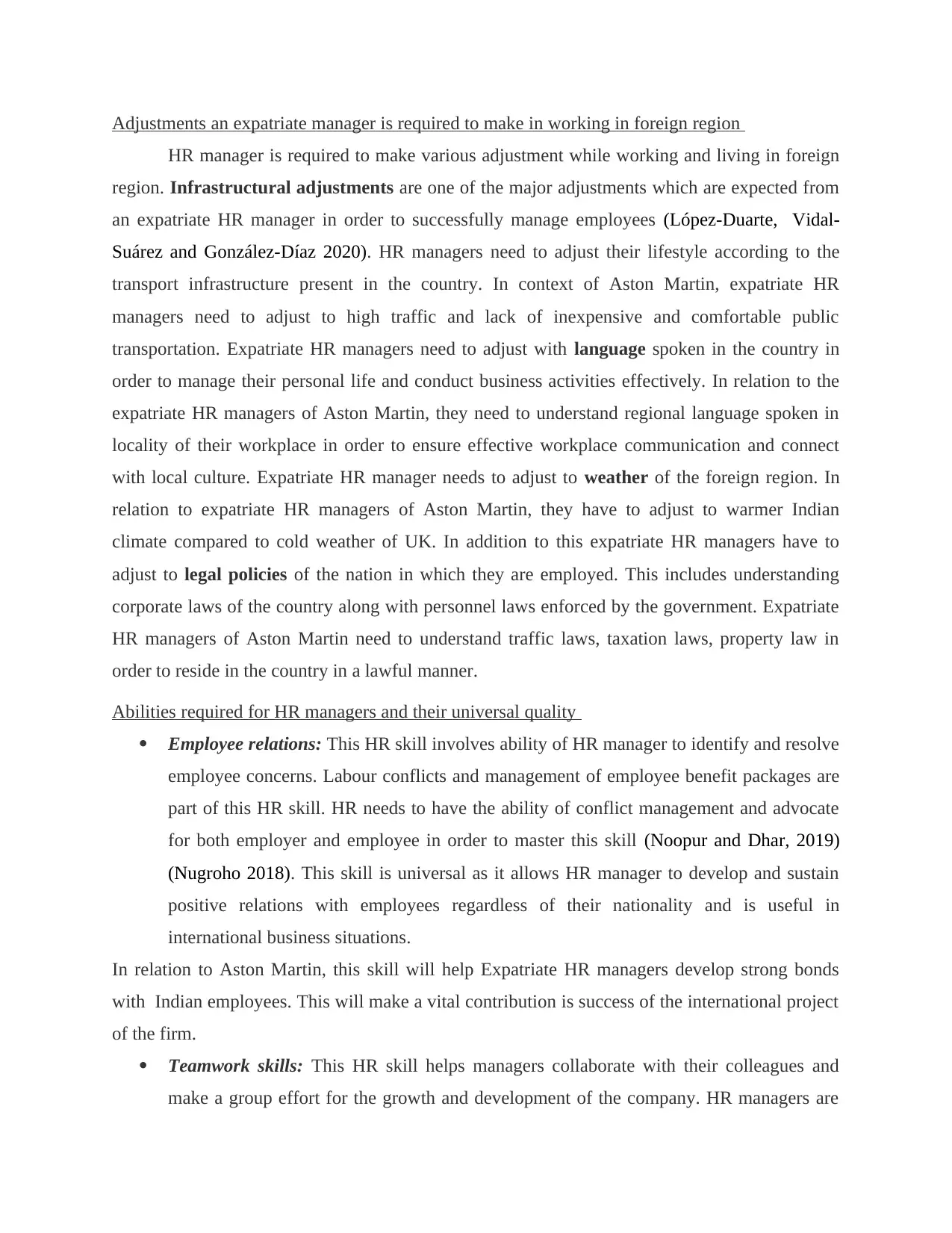
Adjustments an expatriate manager is required to make in working in foreign region
HR manager is required to make various adjustment while working and living in foreign
region. Infrastructural adjustments are one of the major adjustments which are expected from
an expatriate HR manager in order to successfully manage employees (López-Duarte, Vidal-
Suárez and González-Díaz 2020). HR managers need to adjust their lifestyle according to the
transport infrastructure present in the country. In context of Aston Martin, expatriate HR
managers need to adjust to high traffic and lack of inexpensive and comfortable public
transportation. Expatriate HR managers need to adjust with language spoken in the country in
order to manage their personal life and conduct business activities effectively. In relation to the
expatriate HR managers of Aston Martin, they need to understand regional language spoken in
locality of their workplace in order to ensure effective workplace communication and connect
with local culture. Expatriate HR manager needs to adjust to weather of the foreign region. In
relation to expatriate HR managers of Aston Martin, they have to adjust to warmer Indian
climate compared to cold weather of UK. In addition to this expatriate HR managers have to
adjust to legal policies of the nation in which they are employed. This includes understanding
corporate laws of the country along with personnel laws enforced by the government. Expatriate
HR managers of Aston Martin need to understand traffic laws, taxation laws, property law in
order to reside in the country in a lawful manner.
Abilities required for HR managers and their universal quality
Employee relations: This HR skill involves ability of HR manager to identify and resolve
employee concerns. Labour conflicts and management of employee benefit packages are
part of this HR skill. HR needs to have the ability of conflict management and advocate
for both employer and employee in order to master this skill (Noopur and Dhar, 2019)
(Nugroho 2018). This skill is universal as it allows HR manager to develop and sustain
positive relations with employees regardless of their nationality and is useful in
international business situations.
In relation to Aston Martin, this skill will help Expatriate HR managers develop strong bonds
with Indian employees. This will make a vital contribution is success of the international project
of the firm.
Teamwork skills: This HR skill helps managers collaborate with their colleagues and
make a group effort for the growth and development of the company. HR managers are
HR manager is required to make various adjustment while working and living in foreign
region. Infrastructural adjustments are one of the major adjustments which are expected from
an expatriate HR manager in order to successfully manage employees (López-Duarte, Vidal-
Suárez and González-Díaz 2020). HR managers need to adjust their lifestyle according to the
transport infrastructure present in the country. In context of Aston Martin, expatriate HR
managers need to adjust to high traffic and lack of inexpensive and comfortable public
transportation. Expatriate HR managers need to adjust with language spoken in the country in
order to manage their personal life and conduct business activities effectively. In relation to the
expatriate HR managers of Aston Martin, they need to understand regional language spoken in
locality of their workplace in order to ensure effective workplace communication and connect
with local culture. Expatriate HR manager needs to adjust to weather of the foreign region. In
relation to expatriate HR managers of Aston Martin, they have to adjust to warmer Indian
climate compared to cold weather of UK. In addition to this expatriate HR managers have to
adjust to legal policies of the nation in which they are employed. This includes understanding
corporate laws of the country along with personnel laws enforced by the government. Expatriate
HR managers of Aston Martin need to understand traffic laws, taxation laws, property law in
order to reside in the country in a lawful manner.
Abilities required for HR managers and their universal quality
Employee relations: This HR skill involves ability of HR manager to identify and resolve
employee concerns. Labour conflicts and management of employee benefit packages are
part of this HR skill. HR needs to have the ability of conflict management and advocate
for both employer and employee in order to master this skill (Noopur and Dhar, 2019)
(Nugroho 2018). This skill is universal as it allows HR manager to develop and sustain
positive relations with employees regardless of their nationality and is useful in
international business situations.
In relation to Aston Martin, this skill will help Expatriate HR managers develop strong bonds
with Indian employees. This will make a vital contribution is success of the international project
of the firm.
Teamwork skills: This HR skill helps managers collaborate with their colleagues and
make a group effort for the growth and development of the company. HR managers are
Paraphrase This Document
Need a fresh take? Get an instant paraphrase of this document with our AI Paraphraser
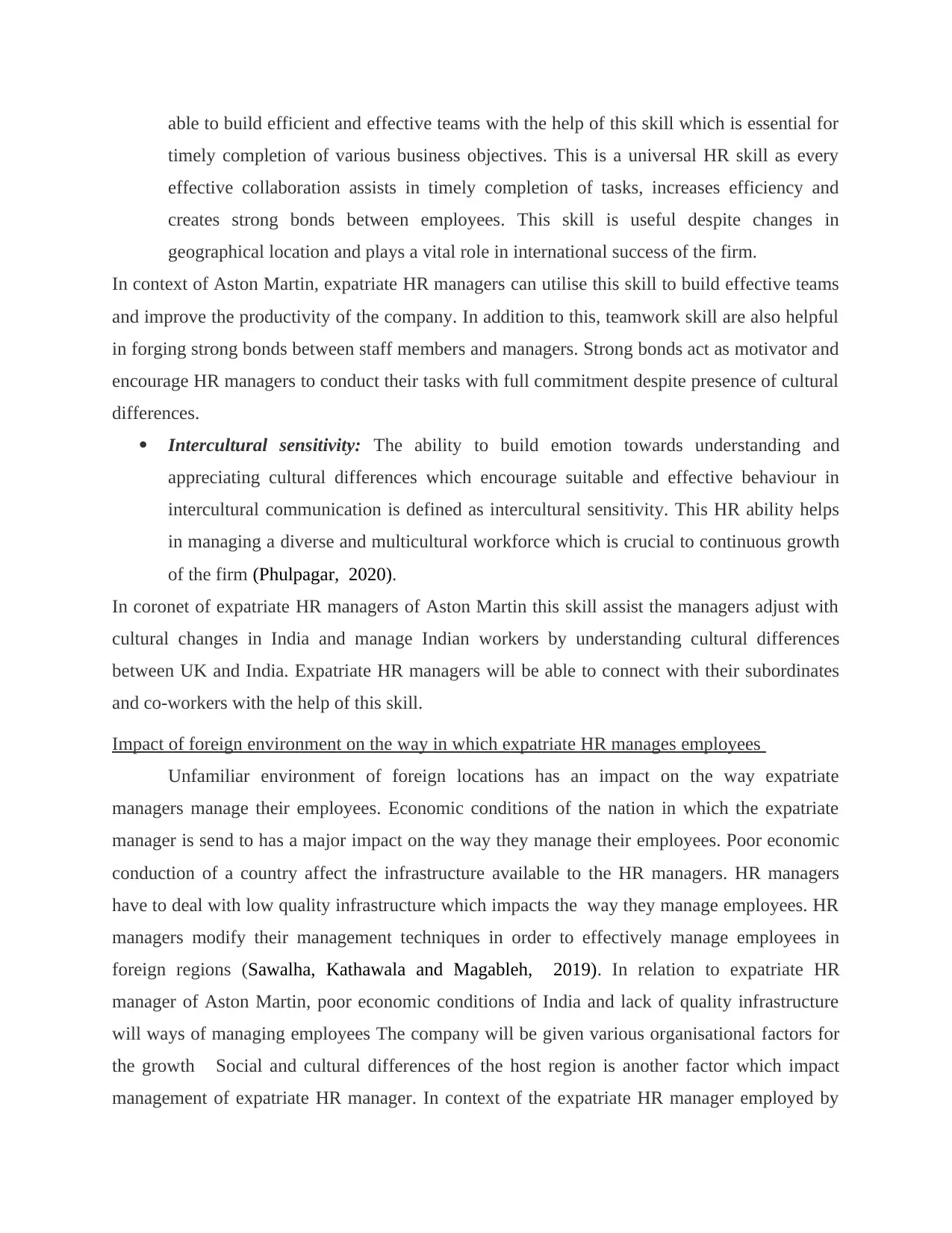
able to build efficient and effective teams with the help of this skill which is essential for
timely completion of various business objectives. This is a universal HR skill as every
effective collaboration assists in timely completion of tasks, increases efficiency and
creates strong bonds between employees. This skill is useful despite changes in
geographical location and plays a vital role in international success of the firm.
In context of Aston Martin, expatriate HR managers can utilise this skill to build effective teams
and improve the productivity of the company. In addition to this, teamwork skill are also helpful
in forging strong bonds between staff members and managers. Strong bonds act as motivator and
encourage HR managers to conduct their tasks with full commitment despite presence of cultural
differences.
Intercultural sensitivity: The ability to build emotion towards understanding and
appreciating cultural differences which encourage suitable and effective behaviour in
intercultural communication is defined as intercultural sensitivity. This HR ability helps
in managing a diverse and multicultural workforce which is crucial to continuous growth
of the firm (Phulpagar, 2020).
In coronet of expatriate HR managers of Aston Martin this skill assist the managers adjust with
cultural changes in India and manage Indian workers by understanding cultural differences
between UK and India. Expatriate HR managers will be able to connect with their subordinates
and co-workers with the help of this skill.
Impact of foreign environment on the way in which expatriate HR manages employees
Unfamiliar environment of foreign locations has an impact on the way expatriate
managers manage their employees. Economic conditions of the nation in which the expatriate
manager is send to has a major impact on the way they manage their employees. Poor economic
conduction of a country affect the infrastructure available to the HR managers. HR managers
have to deal with low quality infrastructure which impacts the way they manage employees. HR
managers modify their management techniques in order to effectively manage employees in
foreign regions (Sawalha, Kathawala and Magableh, 2019). In relation to expatriate HR
manager of Aston Martin, poor economic conditions of India and lack of quality infrastructure
will ways of managing employees The company will be given various organisational factors for
the growth Social and cultural differences of the host region is another factor which impact
management of expatriate HR manager. In context of the expatriate HR manager employed by
timely completion of various business objectives. This is a universal HR skill as every
effective collaboration assists in timely completion of tasks, increases efficiency and
creates strong bonds between employees. This skill is useful despite changes in
geographical location and plays a vital role in international success of the firm.
In context of Aston Martin, expatriate HR managers can utilise this skill to build effective teams
and improve the productivity of the company. In addition to this, teamwork skill are also helpful
in forging strong bonds between staff members and managers. Strong bonds act as motivator and
encourage HR managers to conduct their tasks with full commitment despite presence of cultural
differences.
Intercultural sensitivity: The ability to build emotion towards understanding and
appreciating cultural differences which encourage suitable and effective behaviour in
intercultural communication is defined as intercultural sensitivity. This HR ability helps
in managing a diverse and multicultural workforce which is crucial to continuous growth
of the firm (Phulpagar, 2020).
In coronet of expatriate HR managers of Aston Martin this skill assist the managers adjust with
cultural changes in India and manage Indian workers by understanding cultural differences
between UK and India. Expatriate HR managers will be able to connect with their subordinates
and co-workers with the help of this skill.
Impact of foreign environment on the way in which expatriate HR manages employees
Unfamiliar environment of foreign locations has an impact on the way expatriate
managers manage their employees. Economic conditions of the nation in which the expatriate
manager is send to has a major impact on the way they manage their employees. Poor economic
conduction of a country affect the infrastructure available to the HR managers. HR managers
have to deal with low quality infrastructure which impacts the way they manage employees. HR
managers modify their management techniques in order to effectively manage employees in
foreign regions (Sawalha, Kathawala and Magableh, 2019). In relation to expatriate HR
manager of Aston Martin, poor economic conditions of India and lack of quality infrastructure
will ways of managing employees The company will be given various organisational factors for
the growth Social and cultural differences of the host region is another factor which impact
management of expatriate HR manager. In context of the expatriate HR manager employed by
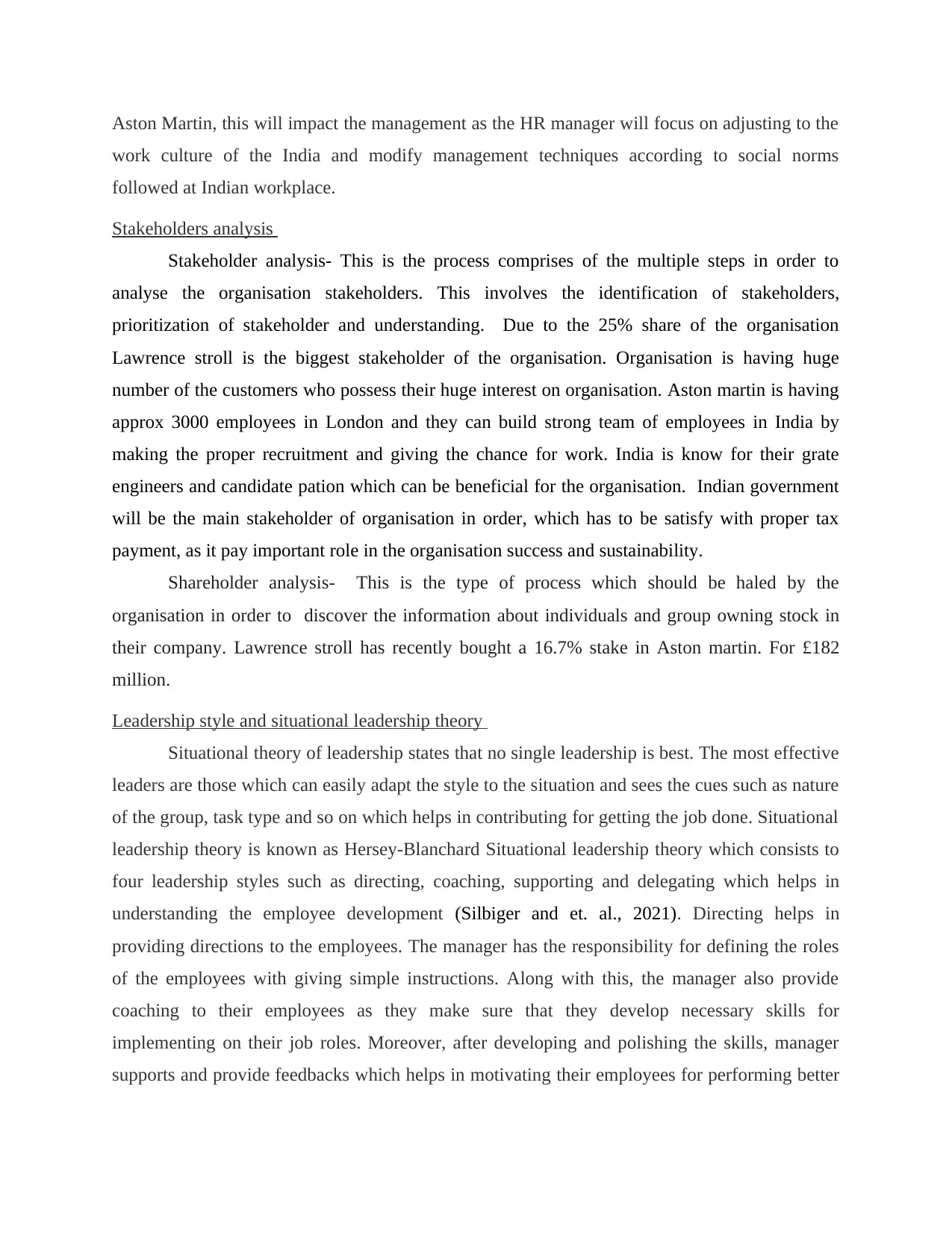
Aston Martin, this will impact the management as the HR manager will focus on adjusting to the
work culture of the India and modify management techniques according to social norms
followed at Indian workplace.
Stakeholders analysis
Stakeholder analysis- This is the process comprises of the multiple steps in order to
analyse the organisation stakeholders. This involves the identification of stakeholders,
prioritization of stakeholder and understanding. Due to the 25% share of the organisation
Lawrence stroll is the biggest stakeholder of the organisation. Organisation is having huge
number of the customers who possess their huge interest on organisation. Aston martin is having
approx 3000 employees in London and they can build strong team of employees in India by
making the proper recruitment and giving the chance for work. India is know for their grate
engineers and candidate pation which can be beneficial for the organisation. Indian government
will be the main stakeholder of organisation in order, which has to be satisfy with proper tax
payment, as it pay important role in the organisation success and sustainability.
Shareholder analysis- This is the type of process which should be haled by the
organisation in order to discover the information about individuals and group owning stock in
their company. Lawrence stroll has recently bought a 16.7% stake in Aston martin. For £182
million.
Leadership style and situational leadership theory
Situational theory of leadership states that no single leadership is best. The most effective
leaders are those which can easily adapt the style to the situation and sees the cues such as nature
of the group, task type and so on which helps in contributing for getting the job done. Situational
leadership theory is known as Hersey-Blanchard Situational leadership theory which consists to
four leadership styles such as directing, coaching, supporting and delegating which helps in
understanding the employee development (Silbiger and et. al., 2021). Directing helps in
providing directions to the employees. The manager has the responsibility for defining the roles
of the employees with giving simple instructions. Along with this, the manager also provide
coaching to their employees as they make sure that they develop necessary skills for
implementing on their job roles. Moreover, after developing and polishing the skills, manager
supports and provide feedbacks which helps in motivating their employees for performing better
work culture of the India and modify management techniques according to social norms
followed at Indian workplace.
Stakeholders analysis
Stakeholder analysis- This is the process comprises of the multiple steps in order to
analyse the organisation stakeholders. This involves the identification of stakeholders,
prioritization of stakeholder and understanding. Due to the 25% share of the organisation
Lawrence stroll is the biggest stakeholder of the organisation. Organisation is having huge
number of the customers who possess their huge interest on organisation. Aston martin is having
approx 3000 employees in London and they can build strong team of employees in India by
making the proper recruitment and giving the chance for work. India is know for their grate
engineers and candidate pation which can be beneficial for the organisation. Indian government
will be the main stakeholder of organisation in order, which has to be satisfy with proper tax
payment, as it pay important role in the organisation success and sustainability.
Shareholder analysis- This is the type of process which should be haled by the
organisation in order to discover the information about individuals and group owning stock in
their company. Lawrence stroll has recently bought a 16.7% stake in Aston martin. For £182
million.
Leadership style and situational leadership theory
Situational theory of leadership states that no single leadership is best. The most effective
leaders are those which can easily adapt the style to the situation and sees the cues such as nature
of the group, task type and so on which helps in contributing for getting the job done. Situational
leadership theory is known as Hersey-Blanchard Situational leadership theory which consists to
four leadership styles such as directing, coaching, supporting and delegating which helps in
understanding the employee development (Silbiger and et. al., 2021). Directing helps in
providing directions to the employees. The manager has the responsibility for defining the roles
of the employees with giving simple instructions. Along with this, the manager also provide
coaching to their employees as they make sure that they develop necessary skills for
implementing on their job roles. Moreover, after developing and polishing the skills, manager
supports and provide feedbacks which helps in motivating their employees for performing better
⊘ This is a preview!⊘
Do you want full access?
Subscribe today to unlock all pages.

Trusted by 1+ million students worldwide
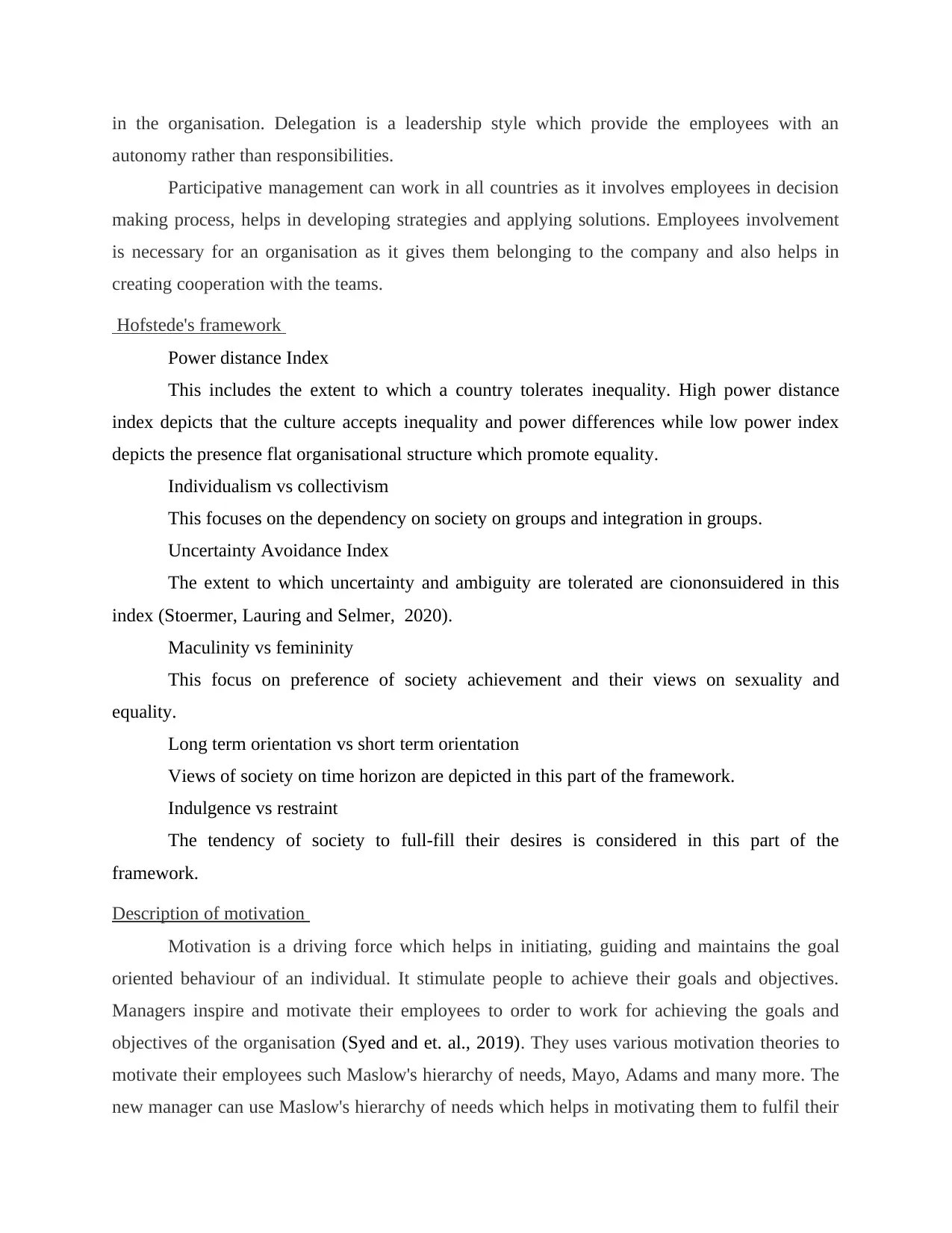
in the organisation. Delegation is a leadership style which provide the employees with an
autonomy rather than responsibilities.
Participative management can work in all countries as it involves employees in decision
making process, helps in developing strategies and applying solutions. Employees involvement
is necessary for an organisation as it gives them belonging to the company and also helps in
creating cooperation with the teams.
Hofstede's framework
Power distance Index
This includes the extent to which a country tolerates inequality. High power distance
index depicts that the culture accepts inequality and power differences while low power index
depicts the presence flat organisational structure which promote equality.
Individualism vs collectivism
This focuses on the dependency on society on groups and integration in groups.
Uncertainty Avoidance Index
The extent to which uncertainty and ambiguity are tolerated are ciononsuidered in this
index (Stoermer, Lauring and Selmer, 2020).
Maculinity vs femininity
This focus on preference of society achievement and their views on sexuality and
equality.
Long term orientation vs short term orientation
Views of society on time horizon are depicted in this part of the framework.
Indulgence vs restraint
The tendency of society to full-fill their desires is considered in this part of the
framework.
Description of motivation
Motivation is a driving force which helps in initiating, guiding and maintains the goal
oriented behaviour of an individual. It stimulate people to achieve their goals and objectives.
Managers inspire and motivate their employees to order to work for achieving the goals and
objectives of the organisation (Syed and et. al., 2019). They uses various motivation theories to
motivate their employees such Maslow's hierarchy of needs, Mayo, Adams and many more. The
new manager can use Maslow's hierarchy of needs which helps in motivating them to fulfil their
autonomy rather than responsibilities.
Participative management can work in all countries as it involves employees in decision
making process, helps in developing strategies and applying solutions. Employees involvement
is necessary for an organisation as it gives them belonging to the company and also helps in
creating cooperation with the teams.
Hofstede's framework
Power distance Index
This includes the extent to which a country tolerates inequality. High power distance
index depicts that the culture accepts inequality and power differences while low power index
depicts the presence flat organisational structure which promote equality.
Individualism vs collectivism
This focuses on the dependency on society on groups and integration in groups.
Uncertainty Avoidance Index
The extent to which uncertainty and ambiguity are tolerated are ciononsuidered in this
index (Stoermer, Lauring and Selmer, 2020).
Maculinity vs femininity
This focus on preference of society achievement and their views on sexuality and
equality.
Long term orientation vs short term orientation
Views of society on time horizon are depicted in this part of the framework.
Indulgence vs restraint
The tendency of society to full-fill their desires is considered in this part of the
framework.
Description of motivation
Motivation is a driving force which helps in initiating, guiding and maintains the goal
oriented behaviour of an individual. It stimulate people to achieve their goals and objectives.
Managers inspire and motivate their employees to order to work for achieving the goals and
objectives of the organisation (Syed and et. al., 2019). They uses various motivation theories to
motivate their employees such Maslow's hierarchy of needs, Mayo, Adams and many more. The
new manager can use Maslow's hierarchy of needs which helps in motivating them to fulfil their
Paraphrase This Document
Need a fresh take? Get an instant paraphrase of this document with our AI Paraphraser
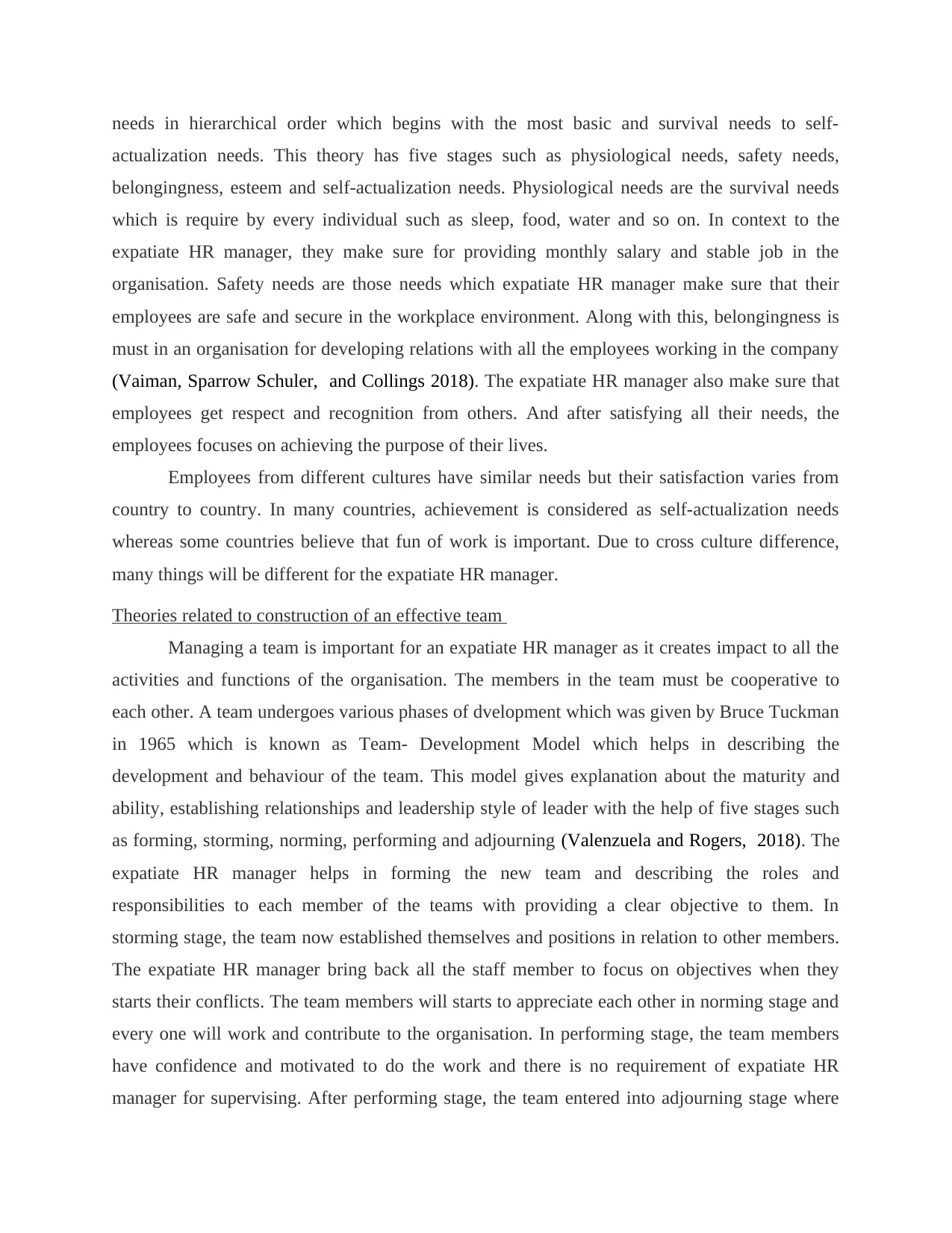
needs in hierarchical order which begins with the most basic and survival needs to self-
actualization needs. This theory has five stages such as physiological needs, safety needs,
belongingness, esteem and self-actualization needs. Physiological needs are the survival needs
which is require by every individual such as sleep, food, water and so on. In context to the
expatiate HR manager, they make sure for providing monthly salary and stable job in the
organisation. Safety needs are those needs which expatiate HR manager make sure that their
employees are safe and secure in the workplace environment. Along with this, belongingness is
must in an organisation for developing relations with all the employees working in the company
(Vaiman, Sparrow Schuler, and Collings 2018). The expatiate HR manager also make sure that
employees get respect and recognition from others. And after satisfying all their needs, the
employees focuses on achieving the purpose of their lives.
Employees from different cultures have similar needs but their satisfaction varies from
country to country. In many countries, achievement is considered as self-actualization needs
whereas some countries believe that fun of work is important. Due to cross culture difference,
many things will be different for the expatiate HR manager.
Theories related to construction of an effective team
Managing a team is important for an expatiate HR manager as it creates impact to all the
activities and functions of the organisation. The members in the team must be cooperative to
each other. A team undergoes various phases of dvelopment which was given by Bruce Tuckman
in 1965 which is known as Team- Development Model which helps in describing the
development and behaviour of the team. This model gives explanation about the maturity and
ability, establishing relationships and leadership style of leader with the help of five stages such
as forming, storming, norming, performing and adjourning (Valenzuela and Rogers, 2018). The
expatiate HR manager helps in forming the new team and describing the roles and
responsibilities to each member of the teams with providing a clear objective to them. In
storming stage, the team now established themselves and positions in relation to other members.
The expatiate HR manager bring back all the staff member to focus on objectives when they
starts their conflicts. The team members will starts to appreciate each other in norming stage and
every one will work and contribute to the organisation. In performing stage, the team members
have confidence and motivated to do the work and there is no requirement of expatiate HR
manager for supervising. After performing stage, the team entered into adjourning stage where
actualization needs. This theory has five stages such as physiological needs, safety needs,
belongingness, esteem and self-actualization needs. Physiological needs are the survival needs
which is require by every individual such as sleep, food, water and so on. In context to the
expatiate HR manager, they make sure for providing monthly salary and stable job in the
organisation. Safety needs are those needs which expatiate HR manager make sure that their
employees are safe and secure in the workplace environment. Along with this, belongingness is
must in an organisation for developing relations with all the employees working in the company
(Vaiman, Sparrow Schuler, and Collings 2018). The expatiate HR manager also make sure that
employees get respect and recognition from others. And after satisfying all their needs, the
employees focuses on achieving the purpose of their lives.
Employees from different cultures have similar needs but their satisfaction varies from
country to country. In many countries, achievement is considered as self-actualization needs
whereas some countries believe that fun of work is important. Due to cross culture difference,
many things will be different for the expatiate HR manager.
Theories related to construction of an effective team
Managing a team is important for an expatiate HR manager as it creates impact to all the
activities and functions of the organisation. The members in the team must be cooperative to
each other. A team undergoes various phases of dvelopment which was given by Bruce Tuckman
in 1965 which is known as Team- Development Model which helps in describing the
development and behaviour of the team. This model gives explanation about the maturity and
ability, establishing relationships and leadership style of leader with the help of five stages such
as forming, storming, norming, performing and adjourning (Valenzuela and Rogers, 2018). The
expatiate HR manager helps in forming the new team and describing the roles and
responsibilities to each member of the teams with providing a clear objective to them. In
storming stage, the team now established themselves and positions in relation to other members.
The expatiate HR manager bring back all the staff member to focus on objectives when they
starts their conflicts. The team members will starts to appreciate each other in norming stage and
every one will work and contribute to the organisation. In performing stage, the team members
have confidence and motivated to do the work and there is no requirement of expatiate HR
manager for supervising. After performing stage, the team entered into adjourning stage where
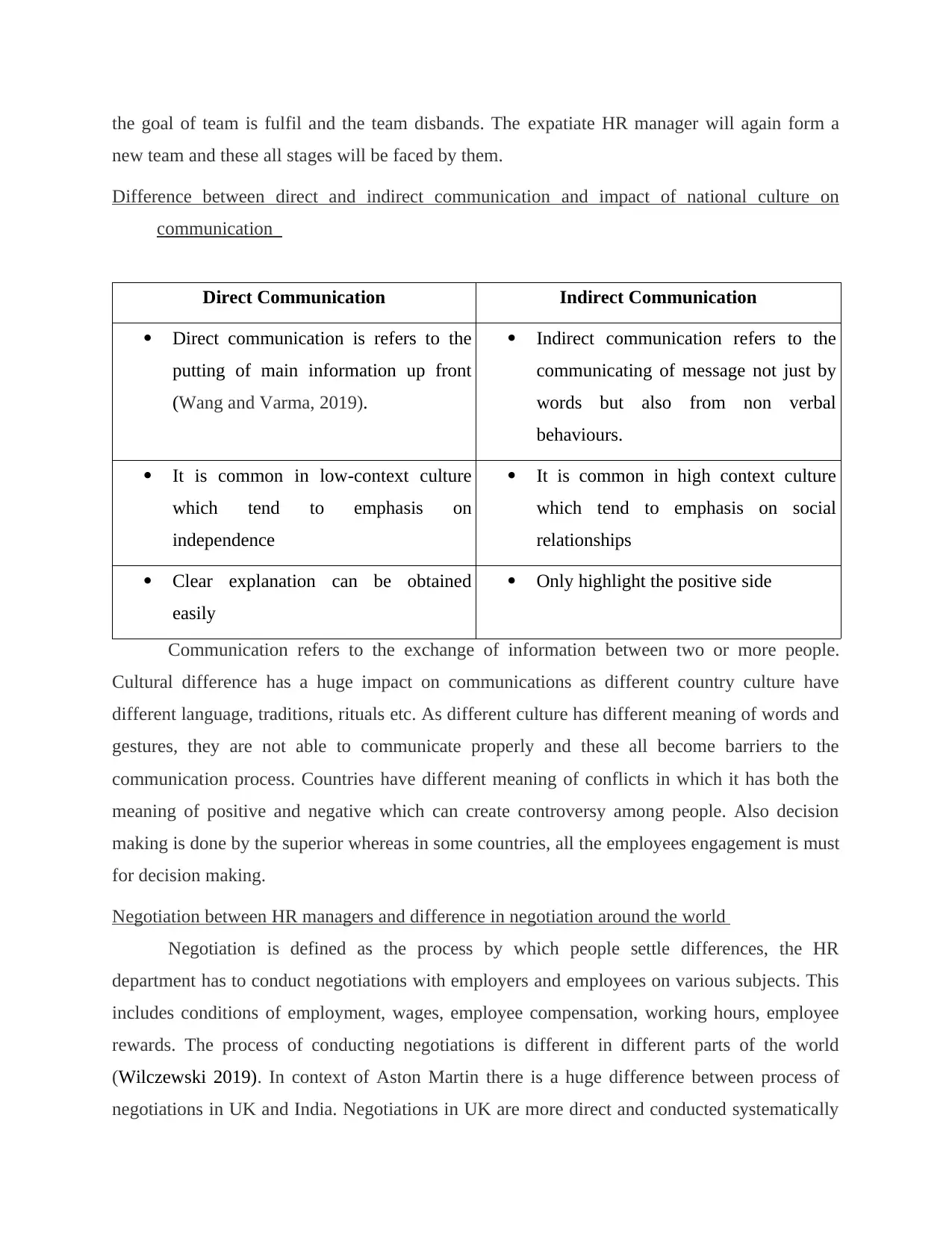
the goal of team is fulfil and the team disbands. The expatiate HR manager will again form a
new team and these all stages will be faced by them.
Difference between direct and indirect communication and impact of national culture on
communication
Direct Communication Indirect Communication
Direct communication is refers to the
putting of main information up front
(Wang and Varma, 2019).
Indirect communication refers to the
communicating of message not just by
words but also from non verbal
behaviours.
It is common in low-context culture
which tend to emphasis on
independence
It is common in high context culture
which tend to emphasis on social
relationships
Clear explanation can be obtained
easily
Only highlight the positive side
Communication refers to the exchange of information between two or more people.
Cultural difference has a huge impact on communications as different country culture have
different language, traditions, rituals etc. As different culture has different meaning of words and
gestures, they are not able to communicate properly and these all become barriers to the
communication process. Countries have different meaning of conflicts in which it has both the
meaning of positive and negative which can create controversy among people. Also decision
making is done by the superior whereas in some countries, all the employees engagement is must
for decision making.
Negotiation between HR managers and difference in negotiation around the world
Negotiation is defined as the process by which people settle differences, the HR
department has to conduct negotiations with employers and employees on various subjects. This
includes conditions of employment, wages, employee compensation, working hours, employee
rewards. The process of conducting negotiations is different in different parts of the world
(Wilczewski 2019). In context of Aston Martin there is a huge difference between process of
negotiations in UK and India. Negotiations in UK are more direct and conducted systematically
new team and these all stages will be faced by them.
Difference between direct and indirect communication and impact of national culture on
communication
Direct Communication Indirect Communication
Direct communication is refers to the
putting of main information up front
(Wang and Varma, 2019).
Indirect communication refers to the
communicating of message not just by
words but also from non verbal
behaviours.
It is common in low-context culture
which tend to emphasis on
independence
It is common in high context culture
which tend to emphasis on social
relationships
Clear explanation can be obtained
easily
Only highlight the positive side
Communication refers to the exchange of information between two or more people.
Cultural difference has a huge impact on communications as different country culture have
different language, traditions, rituals etc. As different culture has different meaning of words and
gestures, they are not able to communicate properly and these all become barriers to the
communication process. Countries have different meaning of conflicts in which it has both the
meaning of positive and negative which can create controversy among people. Also decision
making is done by the superior whereas in some countries, all the employees engagement is must
for decision making.
Negotiation between HR managers and difference in negotiation around the world
Negotiation is defined as the process by which people settle differences, the HR
department has to conduct negotiations with employers and employees on various subjects. This
includes conditions of employment, wages, employee compensation, working hours, employee
rewards. The process of conducting negotiations is different in different parts of the world
(Wilczewski 2019). In context of Aston Martin there is a huge difference between process of
negotiations in UK and India. Negotiations in UK are more direct and conducted systematically
⊘ This is a preview!⊘
Do you want full access?
Subscribe today to unlock all pages.

Trusted by 1+ million students worldwide
1 out of 16
Related Documents
Your All-in-One AI-Powered Toolkit for Academic Success.
+13062052269
info@desklib.com
Available 24*7 on WhatsApp / Email
![[object Object]](/_next/static/media/star-bottom.7253800d.svg)
Unlock your academic potential
Copyright © 2020–2026 A2Z Services. All Rights Reserved. Developed and managed by ZUCOL.





